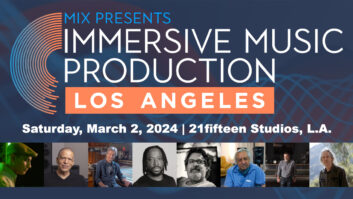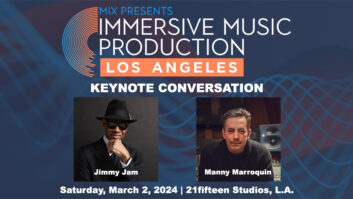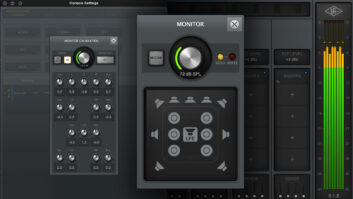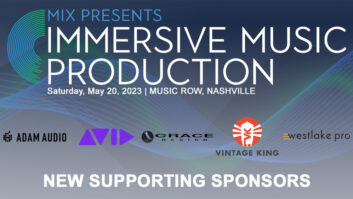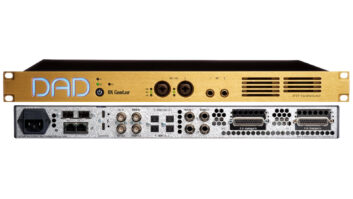Audio on the Internet. Does that intrigue you or scare you? If you work for a large record company, or your business depends on major-label work, then it would seem you have a right to be scared. After all, your long-established way of doing business is suddenly facing competition from an uncontrolled, unregulated, unlicensed, unruly and, most importantly, sometimes-unremunerative distribution channel. The World Wide Web, and especially the new MP3 protocol, the fearmongers say, will allow anyone to obtain any piece of music at any time for free, and once that cat’s out of the bag, no one’s going to want to pay for CDs and cassettes.
The major labels-and the news media that are in many cases owned by the same media conglomerates-have made substantial amounts of noise about this potential threat to the American Way of Life. But what is really going to happen?
In case you’ve been hiding in your Y2K shelter for the past year or so, MP3 (formally known as the Motion Picture Experts Group Audio Layer 3) is a very clever compression scheme that allows audio files to be squeezed down to tiny size-typically 10:1 or better-so that a three-minute song, which as an uncompressed 16-bit PCM file would occupy 30 megabytes, requires only 3 megabytes in MP3 format. This has lots of ramifications for the Internet, where space equals time equals money. An album track can be posted by anyone with a 56k connection to a newsgroup or home page in a few minutes, and downloaded by anyone else, anywhere in the world, in the same amount of time. Thus, a Jewel fan can create her own online Greatest Hits album and make it available to anyone at no cost-but neither Jewel nor anyone else in the food chain ever gets a dime.
There’s a story going around, earnestly repeated by usually respectable sources, that “MP3” is the second-most-common search word on Internet engines, after “sex.” Personally, I think this is bogus (I’m sure there’s still a whole lot more call for “Monica + cigar,” and similarly weighty topics), but it does indicate that the music industry, at least, thinks this stuff is very serious indeed.
I don’t claim to be an expert on either the technical or political issues surrounding MP3, and I’m certainly not going to try to cover the whole spectrum of opinion in this column (there are plenty of other places you can do that, such as the Web sites for mp3.com and the RIAA), but allow me to offer some perspectives that might help you dig out from under the avalanche of partisan press releases and scare headlines.
For one thing, it’s important to remember that this is hardly the first time the entertainment industry has decided that a new consumer technology will bring about The End of The World. In the early 1980s, a bunch of major labels declared war on record stores who sold blank cassettes. The labels threatened to pull their co-op advertising dollars (money that helps stores buy newspaper ads, in exchange for promoting specific titles) from any store that also advertised blank tape, claiming that the stores were promoting piracy. They backed up these claims with a study, commissioned by Warner/Elektra (as it was then known), that “proved” billions of dollars of record revenue were being lost to home taping.
The study turned out to be a load of rubbish, and another study, paid for by a consumer audio manufacturers’ coalition-who presumably had a much smaller axe to grind, since they could go right on selling equipment no matter who won-showed that the vast majority of home taping consisted of people making dubs of records they already owned, for use in their cars and personal stereos, and that in fact people who taped albums at home bought more records than people who didn’t.
Nevertheless, the labels, through the RIAA, pushed for a blank tape tax, the proceeds of which would be distributed, through some undetermined formula, to artists who were purportedly hurt by home taping-Michael Jackson’s name was bandied about a lot. Frank Zappa, in his autobiography, made the case that the record companies were so hungry for the extra revenue that they were willing to stifle their own artists and accede to the “Washington Wives'” demands to put parental warning labels on albums, if Congress would pass the tape-tax bill. Fortunately, the bill stalled, although some other countries have not been so lucky. As far as the warning labels are concerned, you can see for yourself how effective they have been at keeping offensive records out of kids’ hands.
Around the same time, the Motion Picture Association of America (aka the major Hollywood studios) sued Sony, claiming that home video taping of Hollywood movies would kill off all their profits, and as makers of Betamax VCRs, Sony was directly responsible for copyright infringement. The landmark case was decided in favor of Sony, which was not only good for consumers but also ended up saving Hollywood’s collective ass, since now hundreds of movies every year which would otherwise show on two screens in Dubuque and then never be heard from again, can at least get back their costs by going straight to video. (Unfortunately, Sony managed to kill off Betamax all by its dumb self, but that’s another story.)
And then there was DAT. Today’s professional mastering format of choice was originally supposed to be a consumer format, but threats of litigation by the record industry stopped it in its tracks, with the result that only “professional” models ended up being produced. This is why, although you can now find S-VHS editing decks and 4x CD burners (which are a lot more of a threat than DATs) for $250, you will never see a DAT deck for less than $600, and why, unless you’re ready to fork over $1,200 or so, you have to deal with that odious SCMS circuit, which makes it impossible to make digital clones of someone else’s material or copy your own masters.
So it’s very much in character for large record companies to be making this massive effort to portray MP3 as the spawn of the devil. But many small labels seem to be gravitating toward it as a way of getting their message out, without having to buy or bully their way into prominent placements in Tower or HMV or on increasingly centralized radio playlists. While the larger labels are hopelessly hung up over nickel-and-dime piracy, the smaller labels see the Net as a marketing opportunity.
Personally, I view this whole situation as a great opportunity for some constructive and long-overdue realignment of the music industry. But if that’s going to happen, and if civil war and extended court battles (whose decisions will no doubt be obsolete by the time they’re rendered) are to be avoided, the two sides in this argument are going to have to stop shouting at each other and find common ground. MP3 is not going to go away, no matter how much litigation the record labels initiate, so they’d better find ways to make it work to their advantage. On the other hand, fans of the medium are going to have to get used to the idea that if someone doesn’t pay artists for what they do, said artists will go find other ways to make a living.
One point to keep in mind is that MP3 audio is not great. It’s remarkably good, considering all the technical flimflammery that’s going on, but still, to claim it is “CD quality” is specious. It’s certainly good enough to listen to when you jog or drive, but I don’t know anyone who seriously considers it the ultimate delivery medium. For many listeners it’s more an for a record, like a slot on a radio playlist, than the real thing. When I hear a new song I like on my car radio, I’m not going to rush home and try to download it from an MP3 site, where it’s not going to sound much better than in my car; I’m going to go to the store (or at least the online store) and buy the CD.
The market for the “real” product, whether it’s CD, tape or DVD, will continue to be strong, as long as there is a significant difference between it and the “virtual” product. Which, of course, raises the question of what happens when uncompressed audio becomes available over the Internet, but I think that that may still be a long way off. Most of the talk about high-speed Internet access for ordinary folks these days centers around cable modems, which certainly have the potential to make downloading of uncompressed audio practical. But already subscribers are finding that their cable modem connections are operating at speeds nowhere near what the systems are supposed to be capable of, and as more subscribers get online, this will slow down even more.
But even if (or when) Internet audio improves radically, it’s not necessarily going to drive record companies into bankruptcy. There are ways that the creators and owners of music can ensure that they are being compensated fairly. The world of business software offers some valuable lessons. While it has not been totally wiped out (especially not in the Third World), piracy of business software is far less common than publishers feared just a few years ago, ever since a couple of well-placed lawsuits made it clear that managers could be held responsible for unauthorized copies of programs on employees’ machines. Serial number tracking (of the software, not the computers-but thanks for trying, Bill), site licensing, liberal upgrade policies and Net-based distribution (which make it easy both for consumers to obtain new software, and for manufacturers to keep track of who has what) have proven tremendous boons for software publishers. There’s no reason why variations on these practices cannot be applied to the distribution of recorded music.
To make this work, however, the record companies are going to have to realize that they need to provide better value for the consumer’s money. The free ride that has let record companies sell CDs for $16, years after the actual cost of making them has gone down below the $1 mark, may well be over. Of course, putting music on the Net will save them money, because if the delivery system is purely electronic, manufacturing, distribution and packaging costs can be almost eliminated. Rather than scream bloody murder at the whole culture, record companies should create new, fair rules for downloading music, and encourage and make it easy for sites to follow the rules.
The download sites themselves, rather than spending all that energy thumbing their noses at the major labels (and it would be helpful if they stopped referring to the programs that extract audio from a CD as “rippers”), can concentrate on their roles as providers of music they like and want their audiences to hear, regardless of whether it comes from a multinational conglomerate or an indie label in someone’s basement. They have the opportunity to become the 21st-century versions of both independent radio stations and specialty record stores, two niches that have been severely depopulated by the growth of corporate radio empires and megastores.
If you ask me whose side I’m on in this battle, I have to admit I tend to favor the MP3 gang. I weep not for the record labels. They’ve always come out ahead no matter what perceived threat has hung over them. As the media companies continue to suck up everything in their path, so that they not only control what music is recorded and how it’s distributed, but also the magazines, newspapers and television shows that tell people what to listen to, anything that attacks that hegemony is okay in my book. Consider that the Sony suit could never happen today, inasmuch as Sony owns both the movie studio and the VCR factory. So the decision over whether to kill home video, rather than being aired in public and decided by a judge, would have been made by an accountant on the basis of how it would affect the company’s balance sheet. I don’t think this is what even the most conservative economists have in mind when they talk about the “free market.”
But you know what? There’s a lot more to Internet audio than just the brouhaha over MP3. And while MP3 is getting all the ink, for those of us in the trenches of audio production, it’s the other stuff that is much more interesting.
What do audio and the Internet have to do with each other? Well, look at it this way: Do a search in your own mind for “audio + radio.” How many ways does audio figure in the context of electromagnetic broadcasting? There’s playing records on the radio, but there’s also creating jingles for radio stations, and recording and editing announcements. There’s music and sound design, as well as field recording and dialog replacement, for TV commercials and programs, which is just radio with pictures. There’s satellite distribution of music, and there’s also satellite links between studios allowing audio production to go on in multiple locations simultaneously. There are wireless microphones and in-ear monitors in the concert hall, wireless hearing-assistance systems in the theater and, of course, cellular phones.
Okay, now substitute “Internet” for “radio.” And consider the infinitely reconfigurable communications paths of the Internet: one-to-many, many-to-one, many-to-many, and one-to-one. Think about all the ways you can use that power for your business: collaborating, outsourcing, marketing, databasing, advertising, contacting and any other verb that involves communicating with people and with machines. Not only are all sorts of things possible, they are going to be necessary, as the Internet continues to become a more ubiquitous part of our culture and more people and companies vie for each others’ attention.
Do I know the answers? Heck, I’m just starting to figure out the questions. And a lot of you are, too. That’s why I’ll be moderating a panel discussion on “Audio on the Web” at the StudioPro99 conference on June 15 and 16, in Universal City, Calif. We’re going to try to cover as many aspects as we can of how audio/Internet issues affect the pro audio industry. We’ll hear from folks who are invested in MP3 and various forms of Internet radio, and from folks who can help make sure you’re getting the best quality out of your Net audio applications, regardless of what you are using them for. And we’ll hear from at least one person who says he’s even more cynical about all this than I am. Information and schedules on the conference can be found at www.mixonline.com/studiopro99ad.html, or call 510/653-3307 and ask for a brochure. I look forward to seeing you there.

